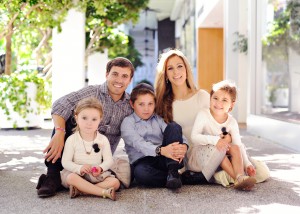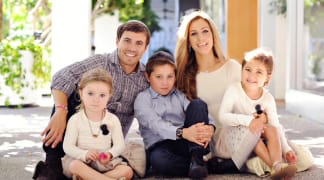
As a delinquent high school student, David Schottenstein toured the globe — jumping from one Jewish high school to the next.
“My cousin used to say that I was escorted from the finest yeshivas in the world,” he laughed, recalling the various adventures he had as he crisscrossed the United States and Europe, traveling from different yeshivas in Ohio, Las Angeles, Miami, Montreal and even Venice.
Though David clarifies that he wasn’t actually ever thrown out of a yeshiva, just politely asked to find a new one every September.
It isn’t hard to imagine that David wasn’t cut out for school. A born entrepreneur from a family of successful businessmen (his uncle helped finance the Artscroll English Talmud), by the time he started high school, David had already launched several businesses. During his junior year, he amassed a small fortune in the stock market and even got into trouble for selling cigars to high school seniors at an NCSY Shabbaton. However, unlike his high schools, NCSY never thought about kicking him out. Instead, they welcomed him in every region, no matter his level of observance.
“Even when I wasn’t interested in being religious, I kept on going to NCSY programs since they were so much fun,” said David who was initially part of the Columbus, Ohio, NCSY chapter. “I wasn’t interested in keeping Shabbat, but I looked forward to the Shabbatons. I never missed a Shabbaton and the friends I made in NCSY are still my friends today.”
Eventually, he landed at an understanding Chabad yeshiva in Brooklyn where he settled down and married his high school sweetheart Eda. He put his boundless energy to work launching his first official company, Astor & Black, which sold affordable high-end custom clothing. After he and Eda married, they moved to Ohio where they promptly helped out the local NCSY chapter that stewarded him through his tumultuous years.
“We hosted the fundraiser and we ran benefits for Central East NCSY,” he said, adding that NCSY helped fill the local shuls with “vibrancy.”
“We’ve always had a strong kesher to NCSY,” he said.
Rabbi Tzali Freedman, regional director of Central East, said that when he dealt with David he recalled a lesson his father taught him.
“My father, of blessed memory, was an educator, and he told me to be very careful with the students that are sent to the office because one day you will have to go see them in their office” Freedman said. “This was very true with David. He was rambunctious, but full of charm and character. Not too many years after his NCSY days, I knocked on his door for NCSY. Not only did he remember NCSY, but was grateful that we never threw him out! Very often the kid with the energy, smarts, creativity and ambition is not the one who flourishes in the regular yeshiva structure. NCSY must be there for every type of kid.”
Astor & Black prospered with clients like the Jonas Brothers and Malcom Jenkins, the all-pro cornerback for the New Orleans Saints. Sales exceeded more than $20 million a year and in 2011, the company was acquired by a private equity firm for $42 million. After a disagreement about the direction of the company, David left. (His suspicions were right; the company declared bankruptcy in 2013).
Since leaving Astor & Black, David launched a new business, View-a-Bill, a company that enables corporations to view their legal bills in real-time instead of waiting until the statement arrives. Since launching in 2013, the company already counts clients like NBC and Disney. One of the partners is none other than attorney Alan Dershowitz.
David said he starts his companies to fill a need that is unmet in the market.
“When I started Astor & Black, the question was: where do you get high-end clothing without being fleeced?” explained David. “I didn’t see it, so I started the company. With View-a-Bill, it was a matter of legal costs accruing over time. I wondered: why can’t I see this in real-time? There was no program that allowed us to do it, so we created it.”
These days, David and his wife live in Bal Harbour, Florida, with their three children. They proudly count NCSY among their many philanthropic investments — all of which, like his businesses, fills an unmet need.
“NCSY is a kosher form of Yiddishkeit for American teens that wouldn’t have it otherwise,” he said. “It keeps them close to what’s important. When it comes time to marry a Jew or not, or live a Jewish lifestyle, the NCSY experience kicks in.”
This article originally appeared in the Fall 2014 issue of NCSY’s Ignite magazine.
The words of this author reflect his/her own opinions and do not necessarily represent the official position of the Orthodox Union.

